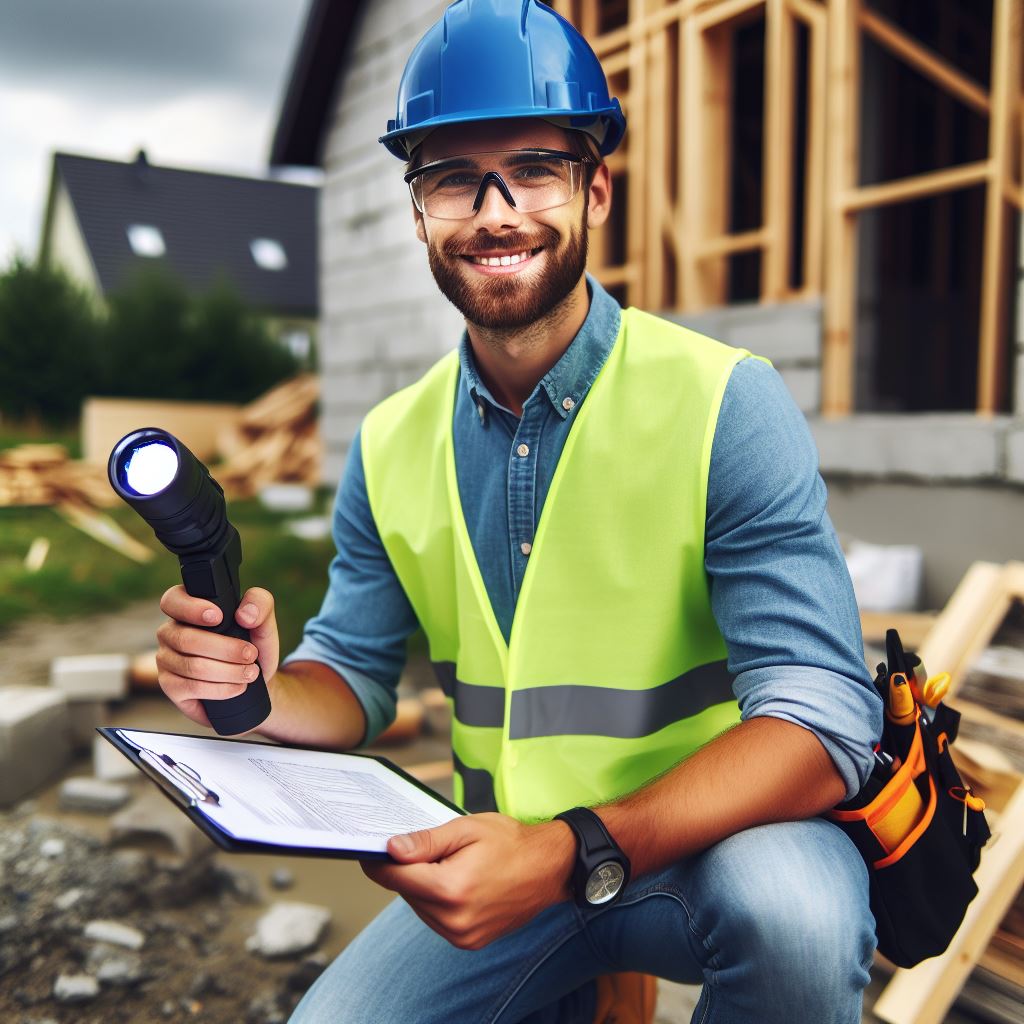Introduction
Home inspection is a crucial step in buying or selling a property, ensuring a comprehensive evaluation of its condition.
The importance of home inspection cannot be underestimated, as it helps identify potential issues and gives peace of mind to both buyers and sellers.
In this blog post, we aim to provide expert tips for a thorough home inspection, allowing you to make informed decisions and prioritize necessary repairs or negotiations.
It is essential to understand that a quality home inspection can save you from future expenses and offer insights into the property’s overall health.
Our experts are dedicated to sharing their knowledge and experience to help you navigate through the inspection process.
We want to ensure that you understand the significance of every aspect that needs to be considered during the inspection.
From the foundation to the roof, we will cover all the critical elements of a home inspection, including plumbing, electrical systems, HVAC, and structural integrity.
Additionally, we will address common red flags to watch out for and provide guidance on how to interpret the inspection report.
By following our expert tips, you will be equipped with the necessary information to make well-informed decisions during the home buying or selling process.
Whether you are a first-time buyer or a seasoned homeowner, our comprehensive guide will empower you to confidently evaluate a property’s condition.
Stay tuned for our next blog section, where we will delve into the first step of a thorough home inspection – examining the foundation.
Importance of Hiring a Professional Home Inspector
When it comes to buying or selling a home, one of the critical steps is the home inspection.
Many people make the mistake of thinking that they can conduct the inspection themselves, but hiring a professional home inspector is highly important.
Here are several reasons why:
Expert Qualifications and Knowledge
- Professional home inspectors undergo specialized training and certification to gain the necessary knowledge.
- They are well-versed in all aspects of a home, including its structure, electrical systems, plumbing, and more.
- Their qualifications enable them to identify potential issues that an untrained eye might easily miss.
Comprehensive Inspection
- Professional home inspectors will thoroughly examine every area of the property, leaving no stone unturned.
- From the roof to the foundation, they will assess the condition of the structure and identify any potential problems.
- They use advanced tools and equipment to uncover hidden defects that may not be apparent at first glance.
Objective and Impartial Report
- A professional home inspector provides an unbiased report on the condition of the property.
- They do not have any emotional attachment or interest in the outcome of the inspection.
- This neutrality allows them to provide an honest assessment and guidance for any necessary repairs or improvements.
Time and Money Saving
- By hiring a professional, you can save both time and money in the long run.
- They have the expertise to identify potential issues before they become major problems.
- This enables you to negotiate repairs or adjustments with the seller before finalizing the deal.
Peace of Mind
- A thorough home inspection conducted by a professional provides peace of mind for both buyers and sellers.
- You can be confident about the condition of the property and make informed decisions based on the inspection report.
- Even if issues are identified, they can be addressed and resolved, ensuring a smooth transaction.
Compliance with Legal Requirements
- In many regions, a home inspection is a crucial step mandated by law in the buying and selling process.
- By hiring a professional home inspector, you ensure that you comply with these legal requirements.
- It protects you from any potential legal issues that may arise during or after the transaction.
Expert Recommendations
- Professional home inspectors often provide valuable recommendations for maintenance, repairs, or improvements.
- They can suggest ways to enhance energy efficiency, safety, and overall comfort within the property.
- These recommendations can help you prioritize tasks and plan for future investments in your home.
In fact, hiring a professional home inspector is an investment that provides numerous benefits.
Transform Your Real Estate Decisions
Unlock personalized real estate insights crafted just for you. Get actionable advice designed to amplify your success.
Get StartedThese experts possess the qualifications, knowledge, and experience to conduct a comprehensive inspection, save you time and money, and provide peace of mind.
When it comes to your home, leaving the inspection to a professional is a decision you won’t regret.
Read: House Hunting Checklist: What Every Buyer Needs
Preparing for the Home Inspection
When it comes to a thorough home inspection, preparation is key. Here are some expert tips to help you get ready:
Gather Necessary Documents and Information
Before the home inspection, it’s essential to gather all the necessary documents and information related to the property. This includes:
- Property documents: Make sure you have copies of the property title, deed, and any other relevant documents.
- Permits and renovations: If you’ve made any renovations or obtained permits, have the paperwork ready to show the inspector.
- Maintenance records: Provide records of any repairs or maintenance work that has been done on the property.
- Appliance manuals and warranties: If there are any appliances included in the sale, have their manuals and warranties ready to share.
- Insurance information: Gather details about the homeowner’s insurance policy, including coverage and any claims made.
Ensure Operational and Accessible Utilities
Another crucial aspect of preparing for a home inspection is making sure that all utilities are operational and easily accessible. Here’s what you need to do:
- Turn on utilities: Ensure that all utilities such as electricity, water, and gas are turned on before the inspection.
- Replace light bulbs: Check and replace any burned-out light bulbs to ensure the inspector can properly assess the lighting in each room.
- Accessible electrical panels: Clear any obstructions in front of electrical panels so that the inspector can easily access them.
- Accessible attic and crawl spaces: Similarly, remove any barriers blocking access to the attic and crawl spaces.
- Test smoke and carbon monoxide detectors: Make sure all smoke detectors and carbon monoxide detectors are functioning properly.
- Unlock gates and doors: Provide easy access to any locked gates, doors, or storage areas on the property.
By following these expert tips, you can ensure that your home inspection process goes smoothly.
Being prepared and organized will help the inspector thoroughly evaluate your property, leading to a more informed buying decision.
Exterior Inspection Checklist
Key areas to inspect on the exterior of the property
Inspecting the exterior of a property is an essential part of a thorough home inspection.
It allows you to identify potential issues that may affect the structural integrity and overall condition of the house. Here is a checklist of key areas to inspect:
- Foundation: Look for cracks, bulges, or any signs of movement in the foundation walls.
- Siding: Check for damaged or missing siding materials, such as wood rot, loose boards, or cracks.
- Roof: Inspect the roof for missing or damaged shingles, loose flashing, or any signs of leaks.
- Gutters: Ensure that gutters and downspouts are clear from debris and properly attached to the house.
- Windows and Doors: Check for proper sealing and operation, look for cracked glass, and ensure the locks are functioning.
- Chimney: Inspect the chimney for cracks, loose bricks, or signs of water damage.
- Deck or Patio: Look for signs of rot, loose boards, or any structural issues that could pose a safety hazard.
- Driveway and Walkways: Check for cracks, uneven surfaces, or any signs of deterioration.
- Landscaping: Assess the condition of trees, shrubs, and plants, especially if they are close to the house.
- Exterior Electrical: Verify the functionality of outdoor outlets and ensure proper grounding.
Potential red flags to look out for
During the exterior inspection, it is important to be aware of potential red flags that may indicate underlying problems:
- Signs of Water Damage: Look for water stains, discoloration, or mold on the exterior walls or near windows.
- Cracks in the Foundation: Pay close attention to cracks wider than a pencil or any horizontal cracks.
- Bulging or Sagging Areas: These may indicate structural issues that require further investigation.
- Rot or Decay: Inspect for signs of wood rot, as it can compromise the integrity of the exterior elements.
- Poor Drainage: Check if the ground slopes away from the foundation to prevent water accumulation.
- Inadequate Ventilation: Make sure there are proper vents for attic and crawl spaces to prevent moisture buildup.
- Cracked or Peeling Paint: This can be a sign of improper preparation or maintenance.
- Improperly Installed or Damaged Siding: Look for gaps, cracks, or loose sections.
By thoroughly inspecting the exterior of a property and paying attention to these key areas and red flags, you can identify any potential issues and make informed decisions regarding the home’s condition and necessary repairs.
It is advisable to hire a professional home inspector to ensure a comprehensive evaluation.
Read: Home Inspection Red Flags You Must Know
Showcase Your Real Estate Business
Publish your company profile on our blog for just $200. Gain instant exposure and connect with a dedicated audience of real estate professionals and enthusiasts.
Publish Your ProfileInterior Inspection Checklist
When conducting a home inspection, it is important to thoroughly examine the interior of the house. Here is a checklist of areas that should be inspected:
Floors
- Check for any signs of damage, such as cracks, stains, or unevenness. Pay attention to the condition of carpets, hardwood floors, or tiles.
- Examine the floors for any sagging or signs of water damage, especially in areas prone to moisture, such as bathrooms or laundry rooms.
- Look for any signs of pest infestation, like termite damage or rodent droppings.
Walls and Ceilings
- Inspect the walls for cracks, peeling paint, or wallpaper that is coming off.
- Check the ceilings for water stains or any signs of leaks from the roof or pipes.
- Look for any visible signs of mold or mildew, especially in areas with higher humidity levels.
Windows
- Open and close each window, checking for smooth operation and any difficulties encountered.
- Inspect the window frames for any signs of rot or damage. Check for proper sealing and insulation.
- Look for condensation between the double-pane windows, as it could indicate problems with the seals.
Plumbing Systems
- Check for any visible leaks under sinks, around toilets, or in the water heater.
- Test all faucets, showers, and toilets to ensure they are in proper working condition.
- Examine exposed pipes for any signs of corrosion, leaks, or inadequate insulation.
- Inspect the water pressure in different areas of the house to ensure it is consistent.
Electrical Systems
- Inspect the electrical panel for proper labeling and ensure there are no tripped breakers.
- Test all outlets and switches to ensure they are functioning correctly.
- Check for any exposed or frayed wires, which could be a potential fire hazard.
- Ensure all light fixtures are in working order and assess the overall lighting throughout the house.
HVAC Equipment
- Inspect the heating and cooling systems, checking for any signs of damage or malfunction.
- Clean or replace the HVAC filters and ensure proper airflow.
- Test the thermostat to ensure accurate temperature control.
- Check the ventilation system for adequate airflow and look for any signs of mold or mildew.
A thorough interior inspection is essential to identify any potential issues that might be present in a home.
By following this checklist and carefully examining each area, you can ensure a comprehensive evaluation of the property.
Remember, it’s always recommended to hire a professional home inspector for a more detailed assessment.
Read: Navigating Your Home Inspection: Top Tips

Roof and Attic Inspection Tips
When conducting a thorough home inspection, it’s crucial not to overlook the roof and attic.
These areas are susceptible to damage and could lead to significant issues if not properly assessed.
Here are some expert tips to help you evaluate the condition of the roof and attic:
Inspecting the Roof
- Examine the shingles carefully, looking for any signs of cracks, warping, or missing pieces.
- Check the gutters for debris buildup, as this can cause water to overflow and damage the roof.
- Assess the condition of the flashing around chimneys, vents, and skylights to ensure they are tightly sealed.
- Look for any algae or moss growth, as it could indicate excess moisture and potential roof damage.
- Consider hiring a professional if you are uncomfortable accessing the roof or notice any severe issues.
Evaluating the Attic
- Check for proper insulation in the attic, as it plays a vital role in energy efficiency and temperature regulation.
- Ensure adequate ventilation to prevent moisture buildup, which can lead to mold growth and structural damage.
- Look for any signs of leaks, such as water stains or damp spots on the attic floor or walls.
- Inspect for pest infestations, including droppings, chewed wood, or nests, which can cause significant damage over time.
- Consider installing a vapor barrier to minimize moisture transfer between the attic and living spaces.
By thoroughly examining the condition of the roof and attic, you can identify potential problems and take appropriate actions to address them.
Remember, a well-maintained roof and adequately insulated attic contribute to a healthier, more energy-efficient home.
Read: Home Inspection 101: A Buyer’s Checklist
Basement and Foundation Inspection Tips
When conducting a thorough home inspection, it is crucial to pay special attention to the basement and foundation.
These areas are vital for the overall stability and integrity of the house.
By thoroughly inspecting the basement and foundation, you can identify potential issues and address them before they become major problems.
Foundation Inspection Tips
Inspecting the foundation is one of the most important aspects of a home inspection.
A strong and stable foundation is essential for the structural integrity of the house. Here are some essential tips to consider:
- Inspect for Cracks: Look for any visible cracks in the foundation walls, both inside and outside the basement. Cracks can indicate foundation settlement or shifting.
- Check for Settling: Look for signs of settling, such as uneven floors or gaps between the walls and the floor or ceiling. This could suggest foundation problems.
- Look for Moisture Intrusion: Moisture intrusion can lead to serious damage, including mold growth and structural issues.
Look for signs of water stains, dampness, or efflorescence on the foundation walls. - Pay Attention to the Exterior: Inspect the exterior of the foundation for any signs of damage or deterioration. Look for cracks, bulges, or crumbling areas.
Basement Inspection Tips
The basement is another critical area to inspect during a thorough home inspection.
It can reveal potential water damage, structural problems, and the presence of mold.
Here are some tips for examining the basement:
- Check for Water Damage: Look for any signs of water intrusion, such as water stains, dampness, or pooling water. Pay attention to the walls, floors, and corners.
- Inspect for Mold: Mold can pose serious health risks and indicate water or moisture problems. Look for visible signs of mold growth, musty odors, or any areas with excessive humidity.
- Examine Structural Stability: Assess the overall structural stability of the basement. Look for any sagging beams, cracks in the walls or floors, or signs of unevenness.
- Check Ventilation and Insulation: Evaluate the ventilation and insulation in the basement. Improper ventilation can lead to moisture problems, while inadequate insulation can affect energy efficiency.
In general, conducting a thorough inspection of the basement and foundation is crucial for any home buyer or homeowner.
By following these expert tips, you can identify potential issues, prevent costly repairs, and ensure the long-term stability and safety of the property.
Plumbing and Electrical Systems Inspection
In a thorough home inspection, it is crucial to pay close attention to the plumbing and electrical systems.
Issues in these areas can lead to significant problems and costly repairs down the line. Here are some essential areas to examine:
Plumbing System
- Fixtures: Inspect sinks, toilets, showers, and faucets for any signs of leaks, corrosion, or damage.
- Pipes: Check both exposed and hidden pipes for leaks, water stains, or mold growth.
- Water Pressure: Test the water pressure in different areas of the house to ensure it is adequate.
- Drainage: Evaluate the efficiency of drains by running water and observing the speed and functionality.
- Water Heater: Examine the water heater for proper functioning, leaks, and signs of wear and tear.
Electrical Systems
- Wiring: Look for outdated, damaged, or exposed wiring that could be hazardous.
- Outlets: Test all outlets to ensure they are grounded, secure, and not loose or damaged.
- Switches: Verify that all switches are functioning correctly and not showing signs of overheating.
- Lighting: Check all light fixtures, both inside and outside, for proper installation and functionality.
- Electrical Panel: Inspect the electrical panel for proper labeling, organization, and any signs of overheating or corrosion.
Why is it important to check these systems thoroughly?
Examining the plumbing and electrical systems is crucial because:
- Identifying plumbing issues such as leaks early can prevent water damage and mold growth.
- Ensuring proper water pressure is essential for adequate supply and functionality of plumbing fixtures.
- Detecting faulty electrical wiring or outlets helps prevent the risk of electrical fires.
- Regular inspection of electrical systems ensures the safety and well-being of the occupants.
- Proactive maintenance and timely repairs can save homeowners from expensive fixes in the future.
What are the potential risks of neglecting these inspections?
Neglecting plumbing and electrical system inspections can lead to various risks:
- Plumbing leaks can cause structural damage, mold growth, and affect the overall integrity of the house.
- Low water pressure can result in inadequate supply, reduced functionality, and frustration for the occupants.
- Outdated or faulty electrical wiring increases the risk of electrical shocks and fire hazards.
- Malfunctioning electrical outlets may damage appliances and pose a danger to individuals.
- Failure to address minor issues promptly can escalate into more significant problems, requiring expensive repairs.
Therefore, it is essential for homeowners to prioritize regular inspections of their plumbing and electrical systems.
Hiring a professional home inspector can provide expert insights and ensure the safety and efficiency of these critical components.
HVAC System Inspection
When conducting a thorough home inspection, one of the most critical areas to focus on is the Heating, Ventilation, and Air Conditioning (HVAC) systems.
These systems play a crucial role in maintaining comfort, air quality, and energy efficiency within a home.
Let’s delve deeper into the significance of inspecting HVAC systems and explore essential tips for evaluating their age, condition, and efficiency.
Showcase Your Real Estate Business
Publish your company profile on our blog for just $200. Gain instant exposure and connect with a dedicated audience of real estate professionals and enthusiasts.
Publish Your ProfileSignificance of inspecting heating, ventilation, and air conditioning systems
Heating, ventilation, and air conditioning systems are the backbone of indoor comfort and climate control.
A comprehensive inspection ensures that these systems are functioning optimally, providing adequate heating and cooling throughout the home.
Moreover, it helps identify any potential issues or safety hazards, such as gas leaks, faulty wiring, or ventilation blockages, which could compromise indoor air quality or pose health risks to occupants.
By assessing the HVAC systems, homeowners can address any maintenance needs promptly, prolonging the lifespan of the equipment and avoiding costly repairs or replacements down the line.
Additionally, regular HVAC inspections contribute to energy efficiency, helping homeowners reduce utility bills and minimize their environmental footprint.
Tips on evaluating the age, condition, and efficiency of HVAC units
Age Assessment
Begin by determining the age of the HVAC units, as older systems may be more prone to wear and less energy-efficient than newer models.
Consult manufacturer documentation or serial numbers to identify the age of the equipment.
Condition Examination
Inspect the condition of the HVAC units for signs of wear, corrosion, or leaks.
Check for rust, cracks, or loose connections in the ductwork, and look for any water stains or moisture buildup around the system, indicating potential leaks.
Efficiency Evaluation
Evaluate the efficiency of the HVAC units by reviewing their energy consumption and performance ratings.
Look for Energy Star certifications or SEER (Seasonal Energy Efficiency Ratio) ratings, which indicate how efficiently the system uses energy to cool the home.
Consider upgrading to newer, more energy-efficient models to save money on utility bills and reduce environmental impact.
In review, conducting a thorough inspection of the HVAC system is essential for maintaining indoor comfort, air quality, and energy efficiency in a home.
By assessing the age, condition, and efficiency of the HVAC units, homeowners can identify any issues early on and take proactive measures to ensure optimal performance and longevity.
Final Tips and Recommendations
After discussing the important aspects of a thorough home inspection, it is essential to provide some final recommendations for homeowners.
These tips will ensure a comprehensive inspection and help keep your home safe:
Additional advice for a comprehensive home inspection
Ensure smoke detectors function by pressing the test button. Replace batteries yearly and units every ten years.
Carbon monoxide detectors should also be tested, usually by pressing a designated button. Regularly replace batteries.
Inspectors may check these during inspections, but it’s wise to confirm their functionality for added safety.
Ask questions and seek clarification from the inspector during the process
Don’t hesitate to ask the inspector about any concerns or unfamiliar terms encountered during the inspection.
Seek clarification on any issues found, ensuring a thorough understanding of the property’s condition.
Inquire about maintenance tips or potential future concerns, empowering you to make informed decisions.
Take advantage of the inspector’s expertise by asking about common problems in similar homes and preventive measures.
Remember, this is your opportunity to gather crucial information about the property’s condition and maintenance needs.
A knowledgeable inspector will welcome questions, fostering a collaborative and informative inspection process.
By actively participating and seeking clarification, you maximize the value of the inspection and your understanding.
Don’t be afraid to ask about the implications of specific findings or the urgency of addressing certain issues.
Your inspector can provide valuable insights into the severity of issues and their potential impact on the property.
Ultimately, the goal of the inspection is to equip you with the knowledge needed to make informed decisions.
Engage with the inspector throughout the process to ensure you leave with a comprehensive understanding of the property.
Showcase Your Real Estate Business
Publish your company profile on our blog for just $200. Gain instant exposure and connect with a dedicated audience of real estate professionals and enthusiasts.
Publish Your ProfileIn a nutshell, proactive engagement and thorough questioning enhance the effectiveness of the home inspection process.
Embrace the opportunity to learn and clarify doubts, empowering yourself as a knowledgeable homeowner or buyer.
Conclusion
Conducting a thorough home inspection is essential for ensuring the safety and well-being of future homeowners.
By following the expert tips provided in this section, readers can rest assured that their homes have been thoroughly inspected and are free from any potential hazards or issues.
Remember, a home is a significant investment and a place where we spend most of our time, so it’s crucial to prioritize its inspection.
By taking the time to inspect every aspect of a home, from the foundation to the roof, potential problems can be identified and addressed before they become costly or dangerous.
Additionally, conducting a thorough home inspection before purchasing a property can provide buyers with negotiation power for necessary repairs or a reduced price.
Therefore, whether you are in the market to buy a new home or have been living in your current home for years, it’s never too late or too early to conduct a comprehensive inspection.
Use the expert tips provided in this section to ensure that your future homes are well-inspected and safe for you and your loved ones.
Don’t overlook the importance of a thorough home inspection—it can save you from unnecessary stress and financial burden in the long run.
So, take the necessary steps to protect your investment and prioritize the safety of your home by conducting a detailed inspection.
Your home is where lifelong memories are made, so make sure it is a safe and secure place for you and your family.




